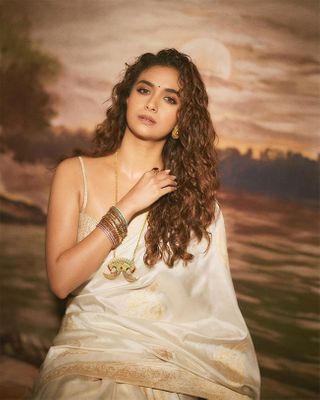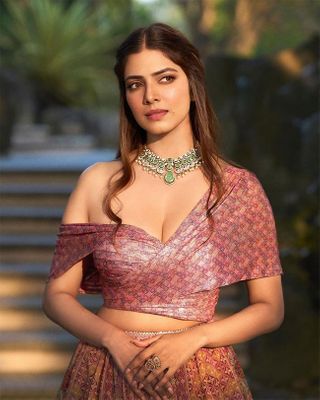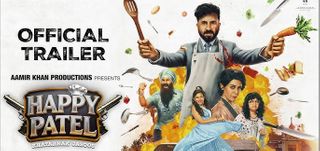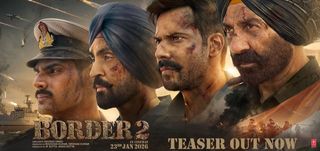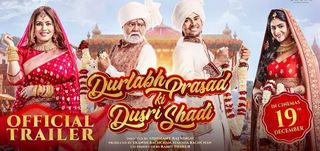Mujhse Dosti Karoge Movie Review
Besides Hrithik Roshan's grin, Kareena Kapoor's pout and Rani Mukherjee's sighs, the pivotal character in Kunal Kohli's debut film Mujhse Dosti Karoge is Erich Segal's immortal paean to mushy romance, Love Story.
Mint-fresh copies of the novel, to match with Shramista Roy's colourful sets, peep out of every nook and cranny of this fluffy romantic triangle.
In the 1973 blockbuster Bobby, which was partly inspired by Segal's novel, an enchanting 15-year-old Dimple Kapadia had created a furore when she looked Rishi Kapoor straight in the eye and said: Mujhse dosti karoge?
The three main characters in Kohli's film keep shaking hands and throwing these three magic words at each other like bits of confetti.
The mood of infectious bonhomie in a upper middleclass household is typical of a Yash Chopra production and so are various thematic motifs such as childhood friends who grow up to be bantering lovers, a parent's death precipitating a flash-marriage in the heroine's life - in Mujhse Dosti... a grieving Kareena runs straight into Hrithik's arms like Sridevi in Lamhe.
But you wonder where the real emotions are while watching the story of three lifelong friends Raj, played by Hrithik, Pooja, by Rani, and Tina, by Kareena, two of whom are destined to be man and wife before the narrative ends.
Rather than delve into the hearts of these three fine actors to crystallise the romantic poignancy indicated in the script about two sister-like friends, one plain and pure, the other glamorous and seductive, pining for the same man, Kohli simply refers back to all of the Chopras' earlier films from Daag to Dilwale Dulhaniya Le Jayenge, and to Karan Johar's Kabhi Khushi Kabhie Gham.
The end product seems like a spot-the-reference contest rather than an original and enduring work of romantic love.
Some of the sequences that are meant to be cute end up being corny. The "final parting" scene where Hrithik brings gobi ka paratha for his ladylove Rani is unintentionally hilarious.
When the lovers are not parting they are busy partying. Though the three are trapped in an emotional dilemma, the ambience supports neither their crisis nor romantic yearnings. Instead it lends a kind of jejune euphoria to the narrative.
As in all Yash Chopra-inspired films, the songs and dances are done with an emphatic elan, whether it's the rock 'n' roll grooves of "Oh my darling" or the traditional wedding item spreading into a lengthy carpet of old film songs.
Unfortunately, the narration never quite seizes the day. Hard as the three characters try, they do not have us rooting for them.
Hrithik abandons the restrained demeanour of his last release Na Tum Jano Na Hum to play an aggressive lover who goes along with his beloved's unreasonable martyrdom only because, according to the film, love is about sacrifice.
Though brilliantly fiery, he looks somewhat out of place doing a new-age Devdas, drink in hand, ire in his eyes and fire in his nostrils.
Kareena's ultra-chic act seems modelled on her role in Kabhi Khushi Kabhie Gham. Stunningly incandescent, she comes into her own at the climax when, in a far-fetched marriage sequence she sacrifices her love for her two best friends.
Rani is an ideal foil to Kareena - dusky, petite, quiet and unostentatious. Though her facial expressions are admirable, they get lost in the glamorous swamp that builds a wall between the audience and the characters.
As a writer and director Kohli tries hard to bring in his own touch to the Chopra-esque ambience. The sequence where Hrithik dances with Rani singing Raj Kapoor's Pyar Hua Iqraar Hua is beautifully controlled in its boudoir ardour.
On the other hand, nostalgia makes way for corny traditionalism when Kohli puts statues of Radha and Krishna into Kareena's bedroom just so that at the end she can quote the holy scriptures while easing out of the Rani-Hrithik relationship.
Shimla and Switzerland are liberally interchang







